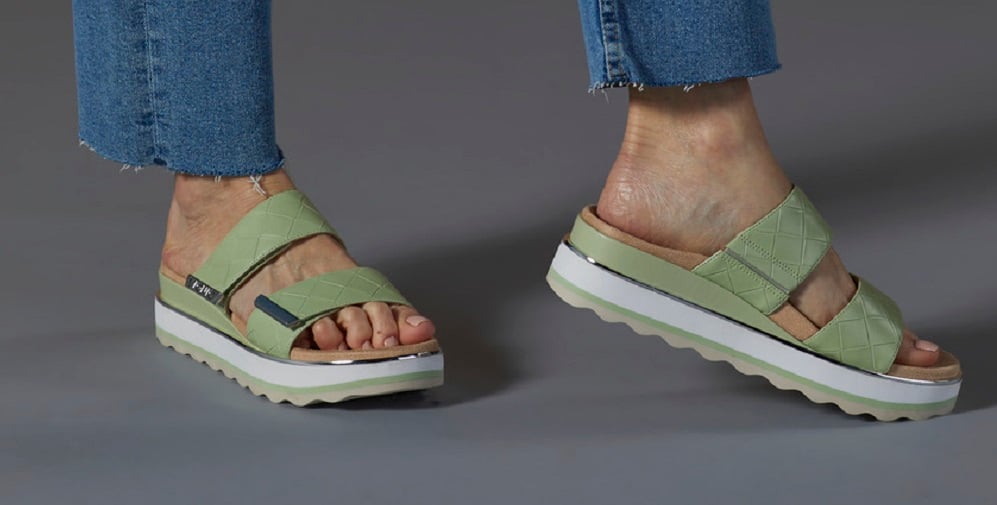
Have you ever experienced that uncomfortable “pins and needles” feeling in your feet?
The sensation could be from spending a few too many hours sitting stationary in the car, or it could be something much worse: neuromas. Also known as pinched nerves, neuromas are a foot ailment that isn’t as easily remedied as a sleepy foot. No matter if you have a pinched nerve in your foot or are experiencing some other kind of foot issue, finding comfortable sandals or any other kind of everyday shoe that provides support is so important.
So, how can you kick pesky pinched nerves to the curb?
Read on for a variety of nerve pain treatments, as well as common causes, symptoms, and preventions to spend more time on your feet and on the go.
Common Signs and Symptoms of Pinched Nerves
Neuromas, or pinched nerves in the foot, are most common among women and occur when a nerve or cluster of nerves experience pressure buildup in the surrounding bones and joints. The American Podiatric Medical Association defines neuromas as nerve tumors that form near the toes. Not to worry—these tumors are benign, but they certainly can cause a fair amount of discomfort.
Those suffering from a neuroma may experience one of the following common symptoms:
- Foot Pain which can be sharp or cause a burning sensation
- Tingling sensation, comparable to when your foot “falls asleep”
- Numbness in the affected nerve injury area
If you’re experiencing one or some of these symptoms—particularly near your toes or the balls of your feet—it may be due to a pinched nerve. Whether chronic pain, numbness, or tingling has been a persistent issue or you’re feeling it for the first time, it’s important to pinpoint the cause to ensure long-term recovery and damaged nerve prevention.
What Causes Pinched Nerves in Feet?
Perhaps you spent too many hours dancing in narrow-toed high heels, or maybe you laced up your track shoes a bit too tightly before your workout. Either way, pinched nerve roots can often be linked to footwear, particularly pairs that keep your toes cramped and inhibit movement.
If you don’t think your shoe is the culprit, there may be other causes causing your chronic pain.
- The shape of your foot – Specifically, your arches. People who are flat-footed may find they are more susceptible to pinched nerve roots. Alternatively, someone with a particularly high arch may find that their weight is being distributed unevenly, which places additional stress and pressure on certain parts of the foot like the toes or the balls of the feet.
- Previous injuries – If you’ve suffered from a fall or are an avid sports player known to give it your all, it’s possible you’ve experienced injuries to your foot that have caused extra strain around the nerve tissue.
- Your body weight – Patients suffering from frequent pinched nerves may find a link between foot pain and their body weight. High body weight may put extra pressure on the nerves of the feet, resulting in a predisposition for neuromas.
- Pregnancy – If you’re expecting a baby, you may be putting on extra weight as you and your baby grow. While putting on weight is healthy during pregnancy, it can also cause swelling in the feet, which can compress the nerves and cause one or multiple neuromas.
- Underlying conditions – You may be more at risk for pinched nerves if you have underlying illnesses. For example, rheumatoid arthritis can inflame your joints and put you at a higher risk of developing neuromas. Bone spurs, cysts, and thyroid disease may also contribute to the development of pinched nerves.
- Occupation – If you start to notice the development or worsening of neuromas, you may want to have a look at what it is you do each day for work. Jobs that require you to be on your feet all day or involve repetitive motions may be at the root of your discomfort.
When suffering from a pinched nerve in the feet, you’ll want to continue to monitor your pain to make sure the symptoms don’t worsen. Depending on the severity of your nerve problem, the road to recovery will look a bit different from patient to patient
How to Treat Pinched Nerves in Feet
Luckily, treatment for a pinched nerve in the foot can often be done right at home, without the need of a podiatrist. However, if you find that your feet are regularly afflicted by neuromas, or that your symptoms worsen over time, you’ll want to schedule an appointment for your podiatrist to have a closer look.
At-Home Treatment
If you’re experiencing a pinched nerve in your foot for the first time, it’s most likely safe to try an at-home remedy before seeking professional help.
- Make changes to your shoes if you think your footwear is to blame. Start by removing high-heeled shoes from your wardrobe or simply loosening the laces of tennis shoes that you’ve found cramp your feet too tightly around the toes. Make sure that all your shoes including sneakers, beach shoes, boots, and more are supportive and comfortable.
- Purchase an over-the-counter insole that can be inserted into your shoes, especially if you have flat feet. Look for an insole with formulated forefoot padding to provide extra cushioning at your toes. This is often an effective and affordable remedy for patients who experience mild symptoms and who are not in need of a more costly, custom pair of orthotics due to more severe issues.
- Gently massage the affected area for immediate relief from pain. Then, apply ice in 20-minute increments and take an over-the-counter pain relief medication like ibuprofen to reduce swelling.
If you’re still not experiencing any relief after trying an at-home treatment, it may be time to put your foot down and enlist the help of a licensed professional to take a look at your foot.

Diagnosis and Treatment by a Doctor
Paying attention to your symptoms and making necessary adjustments to relieve discomfort is the best way to keep your condition from getting worse. However, in some cases, nerve tumors grow too large to be properly treated at home.
If so, contact a licensed podiatrist to professionally assess your condition.
While each podiatrist may differ in treatment plans, most podiatrists follow general diagnosis and recovery guidelines:
- Examination – A podiatrist may simply need to perform an external examination of your foot to determine the severity of your case. In other cases, X-ray imaging, MRIs, or ultrasounds will be required in order to have a closer look at what’s going on in and around the affected area of your foot.
- Recommendations – Doctors may recommend easing your symptoms with a pair of custom orthotics. Unlike over-the-counter insoles, these are designed specifically for your feet to provide you with personalized support wherever you need it most.
- Physical Treatments – Physical therapy may be another viable option to relieve the pain and underlying issues surrounding pinched nerves in the foot. This treatment method will likely consist of a personalized routine of recommended stretches and exercises designed to target the affected area and to strengthen the surrounding tendons, ligaments, and bones.
- Medicinal Treatments – Podiatrists may also prescribe medications like corticosteroids, which can be taken orally or administered via injection near the site of the neuroma.
- Surgery – If treatment is unsuccessful, some patients may need to undergo podiatric surgery to remove the swollen nerve. Although this type of surgery is invasive, the recovery period is typically no longer than two weeks.
Treatment plans can be expensive, lengthy, and uncomfortable. So, how can you stop a pinched nerve in its tracks and avoid the doctor’s visits? Keep neuromas on their feet and be proactive about your foot health.
How to Prevent Pinched Nerves
First, don’t wait until the pain starts. Instead, be mindful of your history of neuromas or other foot problems like peroneal tendonitis, the amount of time you spend on your feet, and the shoes you’re wearing. If you prescribe to the following tips, you’ll be a shoe-in for foot health:
- Reduce the amount of stress you’re putting on your feet throughout the day by maintaining a healthy weight that’s appropriate for your body height and composition.
- Avoid crossing your legs for long periods of time and take frequent breaks from repetitive activities, such as running or playing basketball, to avoid irritation to the balls of your feet and reduce the risk of developing a neuroma.
- Address any underlying issues, like diabetes, which may be causing poor circulation in your feet, contributing to tingling sensations and numbness in your toes.
- Invest in a supportive pair of everyday walking shoes, sandals, or slippers so that your feet are well-cushioned all day, every day—even when you’re lounging at home.
- Start your day with a ten-minute stretching routine to expand and build strength in the muscles in and around your foot. It’s never too early to start stretching, even if you don’t have a specialized plan from a physical therapist. Stretching can also be beneficial for plantar fasciitis sufferers. If you’ve ever wondered if pinched nerves can be prevented or if plantar fasciitis goes away, stretching is a great way to answer that.
Enhance Your Foot Health with Vionic
Just like inside ankle pain, a pinched nerve can be painful, and just plain inconvenient. Luckily, those who suffer from pinched nerve symptoms have a footpath toward recovery.
Vionic is here to help along that journey.
We are a team of professionals who care about enhancing your foot health. Using breakthrough technology, such as the Zone Comfort model, we provide arch-supporting, toe-cushioning, heel-stabilizing, podiatrist-approved shoes and inserts designed specifically for your comfort.
If you’re looking for footwear that supports your neuroma-prone feet but won’t sacrifice on style, look no further than Vionic. Or, add an extra layer of support with our Vionic Insoles, which can be fitted into every shoe, from tennis shoes to soccer cleats.
Begin your journey today by shopping our collection of sandals, activewear, dress shoes, and more at Vionic.
Sources:
- “Neuromas”. American Podiatric Medical Association. https://www.apma.org/neuromas
- Jill Seladi-Schulman. “What Causes a Pinched Nerve in Your Foot and How Can You Treat It?”. Healthline. Aug 19, 2019, https://www.healthline.com/health/symptom/pinched-nerve-in-foot



Leave a Reply